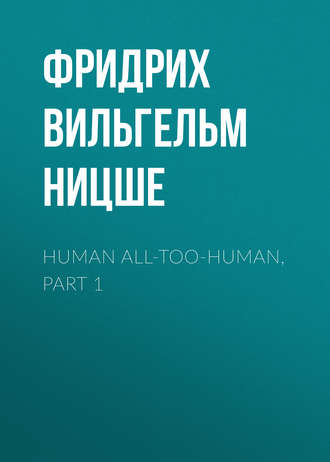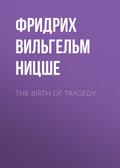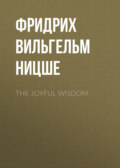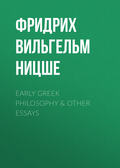
Фридрих Вильгельм Ницше
Human All-Too-Human, Part 1
376
Of Friends. – Just consider with thyself how different are the feelings, how divided are the opinions of even the nearest acquaintances; how even the same opinions in thy friend's mind have quite a different aspect and strength from what they have in thine own; and how manifold are the occasions which arise for misunderstanding and hostile severance. After all this thou wilt say to thyself, "How insecure is the ground upon which all our alliances and friendships rest, how liable to cold downpours and bad weather, how lonely is every creature!" When a person recognises this fact, and, in addition, that all opinions and the nature and strength of them in his fellow-men are just as necessary and irresponsible as their actions; when his eye learns to see this internal necessity of opinions, owing to the indissoluble interweaving of character, occupation, talent, and environment, – he will perhaps get rid of the bitterness and sharpness of the feeling with which the sage exclaimed, "Friends, there are no friends!" Much rather will he make the confession to himself: – Yes, there are friends, but they were drawn towards thee by error and deception concerning thy character; and they must have learnt to be silent in order to remain thy friends; for such human relationships almost always rest on the fact that some few things are never said, are never, indeed, alluded to; but if these pebbles are set rolling friendship follows afterwards and is broken. Are there any who would not be mortally injured if they were to learn what their most intimate friends really knew about them? By getting a knowledge of ourselves, and by looking upon our nature as a changing sphere of opinions and moods, and thereby learning to despise ourselves a little, we recover once more our equilibrium with the rest of mankind. It is true that we have good reason to despise each of our acquaintances, even the greatest of them; but just as good reason to turn this feeling against ourselves. And so we will bear with each other, since we bear with ourselves; and perhaps there will come to each a happier hour, when he will exclaim:
"Friends, there are really no friends!" thus cried
th' expiring old sophist;
"Foes, there is really no foe!" – thus shout I,
the incarnate fool.
SEVENTH DIVISION
WIFE AND CHILD
377
The Perfect Woman. – The perfect woman is a higher type of humanity than the perfect man, and also something much rarer. The natural history of animals furnishes grounds in support of this theory.
378
Friendship and Marriage. – The best friend will probably get the best wife, because a good marriage is based on talent for friendship.
379
The Survival of the Parents. – The undissolved dissonances in the relation of the character and sentiments of the parents survive in the nature of the child and make up the history of its inner sufferings.
380
Inherited from the Mother. – Every one bears within him an image of woman, inherited from his mother: it determines his attitude towards women as a whole, whether to honour, despise, or remain generally indifferent to them.
381
Correcting Nature. – Whoever has not got a good father should procure one.
382
Fathers and Sons. – Fathers have much to do to make amends for having sons.
383
The Error of Gentlewomen. – Gentle-women think that a thing does not really exist when it is not possible to talk of it in society.
384
A Male Disease. – The surest remedy for the male disease of self-contempt is to be loved by a sensible woman.
385.
A Species of Jealousy. – Mothers are readily jealous of the friends of sons who are particularly successful. As a rule a mother loves herself in her son more than the son.
386
RATIONAL IRRATIONALITY. – In the maturity of life and intelligence the feeling comes over a man that his father did wrong in begetting him.
387
Maternal Excellence. – Some mothers need happy and honoured children, some need unhappy ones, – otherwise they cannot exhibit their maternal excellence.
388
Different Sighs. – Some husbands have sighed over the elopement of their wives, the greater number, however, have sighed because nobody would elope with theirs.
389
Love Matches. – Marriages which are contracted for love (so-called love-matches) have error for their father and need (necessity) for their mother.
390
Women's Friendships. – Women can enter into friendship with a man perfectly well; but in order to maintain it the aid of a little physical antipathy is perhaps required.
391
Ennui. – Many people, especially women, never feel ennui because they have never learnt to work properly.
392
An Element of Love. – In all feminine love something of maternal love also comes to light.
393
Unity of Place and Drama. – If married couples did not live together, happy marriages would be more frequent.
394
The Usual Consequences of Marriage. – All intercourse which does not elevate a person, debases him, and vice versa; hence men usually sink a little when they marry, while women are somewhat elevated. Over-intellectual men require marriage in proportion as they are opposed to it as to a repugnant medicine.
395
Learning to Command. – Children of unpretentious families must be taught to command, just as much as other children must be taught to obey.
396
Wanting to Be in Love. – Betrothed couples who have been matched by convenience often exert themselves to fall in love, to avoid the reproach of cold, calculating expediency. In the same manner those who become converts to Christianity for their advantage exert themselves to become genuinely pious; because the religious cast of countenance then becomes easier to them.
397
No Standing Still in Love. – A musician who loves the slow tempo will play the same pieces ever more slowly. There is thus no standing still in any love.
398
Modesty. – Women's modesty usually increases with their beauty.15
399
Marriage on a Good Basis. – A marriage in which each wishes to realise an individual aim by means of the other will stand well; for instance, when the woman wishes to become famous through the man and the man beloved through the woman.
400
Proteus-nature. – Through love women actually become what they appear to be in the imagination of their lovers.
401
To Love and to Possess. – As a rule women love a distinguished man to the extent that they wish to possess him exclusively. They would gladly keep him under lock and key, if their vanity did not forbid, but vanity demands that he should also appear distinguished before others.
402
The Test of a Good Marriage. – The goodness of a marriage is proved by the fact that it can stand an "exception."
403
Bringing Anyone Round to Anything. – One may make any person so weak and weary by disquietude, anxiety, and excess of work or thought that he no longer resists anything that appears complicated, but gives way to it, – diplomatists and women know this.
404
Propriety and Honesty. – Those girls who mean to trust exclusively to their youthful charms for their provision in life, and whose cunning is further prompted by worldly mothers, have just the same aims as courtesans, only they are wiser and less honest.
405
Masks. – There are women who, wherever one examines them, have no inside, but are mere masks. A man is to be pitied who has connection with such almost spectre-like and necessarily unsatisfactory creatures, but it is precisely such women who know how to excite a man's desire most strongly; he seeks for their soul, and seeks evermore.
406
Marriage As a Long Talk. – In entering on a marriage one should ask one's self the question, "Do you think you will pass your time well with this woman till your old age?" All else in marriage is transitory; talk, however, occupies most of the time of the association.
407
Girlish Dreams. – Inexperienced girls flatter themselves with the notion that it is in their power to make a man happy; later on they learn that it is equivalent to underrating a man to suppose that he needs only a girl to make him happy. Women's vanity requires a man to be something more than merely a happy husband.
408
The Dying-out of Faust and Marguerite. – According to the very intelligent remark of a scholar, the educated men of modern Germany resemble somewhat a mixture of Mephistopheles and Wagner, but are not at all like Faust, whom our grandfathers (in their youth at least) felt agitating within them. To them, therefore, – to continue the remark, – Marguerites are not suited, for two reasons. And because the latter are no longer desired they seem to be dying out.
409
Classical Education For Girls. – For goodness' sake let us not give our classical education to girls! An education which, out of ingenious, inquisitive, ardent youths, so frequently makes – copies of their teacher!
410
Without Rivals. – Women readily perceive in a man whether his soul has already been taken possession of; they wish to be loved without rivals, and find fault with the objects of his ambition, his political tasks, his sciences and arts, if he have a passion for such things. Unless he be distinguished thereby, – then, in the case of a love-relationship between them, women look at the same time for an increase of their own distinction; under such circumstances, they favour the lover.
411
The Feminine Intellect. – The intellect of women manifests itself as perfect mastery, presence of mind, and utilisation of all advantages. They transmit it as a fundamental quality to their children, and the father adds thereto the darker background of the will. His influence determines as it were the rhythm and harmony with which the new life is to be performed; but its melody is derived from the mother. For those who know how to put a thing properly: women have intelligence, men have character and passion. This does not contradict the fact that men actually achieve so much more with their intelligence: they have deeper and more powerful impulses; and it is these which carry their understanding (in itself something passive) to such an extent. Women are often silently surprised at the great respect men pay to their character. When, therefore, in the choice of a partner men seek specially for a being of deep and strong character, and women for a being of intelligence, brilliancy, and presence of mind, it is plain that at bottom men seek for the ideal man, and women for the ideal woman, – consequently not for the complement but for the completion of their own excellence.
412
Hesiod's Opinion Confirmed. – It is a sign of women's wisdom that they have almost always known how to get themselves supported, like drones in a bee-hive. Let us just consider what this meant originally, and why men do not depend upon women for their support. Of a truth it is because masculine vanity and reverence are greater than feminine wisdom; for women have known how to secure for themselves by their subordination the greatest advantage, in fact, the upper hand. Even the care of children may originally have been used by the wisdom of women as an excuse for withdrawing themselves as much as possible from work. And at present they still understand when they are really active (as house-keepers, for instance) how to make a bewildering fuss about it, so that the merit of their activity is usually ten times over-estimated by men.
413
Lovers As Short-sighted People. – A pair of powerful spectacles has sometimes sufficed to cure a person in love; and whoever has had sufficient imagination to represent a face or form twenty years older, has probably gone through life not much disturbed.
414
Women in Hatred. – In a state of hatred women are more dangerous than men; for one thing, because they are hampered by no regard for fairness when their hostile feelings have been aroused; but let their hatred develop unchecked to its utmost consequences; then also, because they are expert in finding sore spots (which every man and every party possess), and pouncing upon them: for which purpose their dagger-pointed intelligence is of good service (whilst men, hesitating at the sight of wounds, are often generously and conciliatorily inclined).
415
Love. – The love idolatry which women practise is fundamentally and originally an intelligent device, inasmuch as they increase their power by all the idealisings of love and exhibit themselves as so much the more desirable in the eyes of men. But by being accustomed for centuries to this exaggerated appreciation of love, it has come to pass that they have been caught in their own net and have forgotten the origin of the device. They themselves are now still more deceived than the men, and on that account also suffer more from the disillusionment which, almost necessarily, enters into the life of every woman – so far, at any rate, as she has sufficient imagination and intelligence to be able to be deceived and undeceived.
416
The Emancipation of Women. – Can women be at all just, when they are so accustomed to love and to be immediately biased for or against? For that reason they are also less interested in things and more in individuals: but when they are interested in things they immediately become their partisans, and thereby spoil their pure, innocent effect. Thus there arises a danger, by no means small, in entrusting politics and certain portions of science to them (history, for instance). For what is rarer than a woman who really knows what science is? Indeed the best of them cherish in their breasts a secret scorn for science, as if they were somehow superior to it. Perhaps all this can be changed in time; but meanwhile it is so.
417
The Inspiration in Women's Judgments. – The sudden decisions, for or against, which women are in the habit of making, the flashing illumination of personal relations caused by their spasmodic inclinations and aversions, – in short, the proofs of feminine injustice have been invested with a lustre by men who are in love, as if all women had inspirations of wisdom, even without the Delphic cauldron and the laurel wreaths; and their utterances are interpreted and duly set forth as Sibylline oracles for long afterwards. When one considers, however, that for every person and for every cause something can be said in favour of it but equally also something against it, that things are not only two-sided, but also three and four-sided, it is almost difficult to be entirely at fault in such sudden decisions; indeed, it might be said that the nature of things has been so arranged that women should always carry their point.16
418
Being Loved. – As one of every two persons in love is usually the one who loves, the other the one who is loved, the belief has arisen that in every love-affair there is a constant amount of love; and that the more of it the one person monopolises the less is left for the other. Exceptionally it happens that the vanity of each of the parties persuades him or her that it is he or she who must be loved; so that both of them wish to be loved: from which cause many half funny, half absurd scenes take place, especially in married life.
419
Contradictions in Feminine Minds. – Owing to the fact that women are so much more personal than objective, there are tendencies included in the range of their ideas which are logically in contradiction to one another; they are accustomed in turn to become enthusiastically fond just of the representatives of these tendencies and accept their systems in the lump; but in such wise that a dead place originates wherever a new personality afterwards gets the ascendancy. It may happen that the whole philosophy in the mind of an old lady consists of nothing but such dead places.
420
Who Suffers the More? – After a personal dissension and quarrel between a woman and a man the latter party suffers chiefly from the idea of having wounded the other, whilst the former suffers chiefly from the idea of not having wounded the other sufficiently; so she subsequently endeavours by tears, sobs, and discomposed mien, to make his heart heavier.
421
An Opportunity For Feminine Magnanimity. – If we could disregard the claims of custom in our thinking we might consider whether nature and reason do not suggest several marriages for men, one after another: perhaps that, at the age of twenty-two, he should first marry an older girl who is mentally and morally his superior, and can be his leader through all the dangers of the twenties (ambition, hatred, self-contempt, and passions of all kinds). This woman's affection would subsequently change entirely into maternal love, and she would not only submit to it but would encourage the man in the most salutary manner, if in his thirties he contracted an alliance with quite a young girl whose education he himself should take in hand. Marriage is a necessary institution for the twenties; a useful, but not necessary, institution for the thirties; for later life it is often harmful, and promotes the mental deterioration of the man.
422
The Tragedy of Childhood. – Perhaps it not infrequently happens that noble men with lofty aims have to fight their hardest battle in childhood; by having perchance to carry out their principles in opposition to a base-minded father addicted to feigning and falsehood, or living, like Lord Byron, in constant warfare with a childish and passionate mother. He who has had such an experience will never be able to forget all his life who has been his greatest and most dangerous enemy.
423
Parental Folly. – The grossest mistakes in judging a man are made by his parents, – this is a fact, but how is it to be explained? Have the parents too much experience of the child and cannot any longer arrange this experience into a unity? It has been noticed that it is only in the earlier period of their sojourn in foreign countries that travellers rightly grasp the general distinguishing features of a people; the better they come to know it, they are the less able to see what is typical and distinguishing in a people. As soon as they grow short-sighted their eyes cease to be long-sighted. Do parents, therefore, judge their children falsely because they have never stood far enough away from them? The following is quite another explanation: people are no longer accustomed to reflect on what is close at hand and surrounds them, but just accept it. Perhaps the usual thoughtlessness of parents is the reason why they judge so wrongly when once they are compelled to judge their children.
424
The Future of Marriage. – The noble and liberal-minded women who take as their mission the education and elevation of the female sex, should not overlook one point of view: Marriage regarded in its highest aspect, as, the spiritual friendship of two persons of opposite sexes, and accordingly such as is hoped for in future, contracted for the purpose of producing and educating a new generation, – such marriage, which only makes use of the sensual, so to speak, as a rare and occasional means to a higher purpose, will, it is to be feared, probably need a natural auxiliary, namely, concubinage. For if, on the grounds of his health, the wife is also to serve for the sole satisfaction of the man's sexual needs, a wrong perspective, opposed to the aims indicated, will have most influence in the choice of a wife. The aims referred to: the production of descendants, will be accidental, and their successful education highly improbable. A good wife, who has to be friend, helper, child-bearer, mother, family-head and manager, and has even perhaps to conduct her own business and affairs separately from those of the husband, cannot at the same time be a concubine; it would, in general, be asking too much of her. In the future, therefore, a state of things might take place the opposite of what existed at Athens in the time of Pericles; the men, whose wives were then little more to them than concubines, turned besides to the Aspasias, because they longed for the charms of a companionship gratifying both to head and heart, such as the grace and intellectual suppleness of women could alone provide. All human institutions, just like marriage, allow only a moderate amount of practical idealising, failing which coarse remedies immediately become necessary.
425
The "Storm and Stress" Period of Women. – In the three or four civilised countries of Europe, it is possible, by several centuries of education, to make out of women anything we like, – even men, not in a sexual sense, of course, but in every other. Under such influences they will acquire all the masculine virtues and forces, at the same time, of course, they must also have taken all the masculine weaknesses and vices into the bargain: so much, as has been said, we can I command. But how shall we endure the intermediate state thereby induced, which may even last two or three centuries, during which feminine follies and injustices, woman's original birthday endowment, will still maintain the ascendancy over all that has been otherwise gained and acquired? This will be the time when indignation will be the peculiar masculine passion; indignation, because all arts and sciences have been overflowed and choked by an unprecedented dilettanteism, philosophy talked to death by brain-bewildering chatter, politics more fantastic and partisan than ever, and society in complete disorganisation, because the conservatrices of ancient customs have become ridiculous to themselves, and have endeavoured in every way to place themselves outside the pale of custom. If indeed women had their greatest power in custom, where will they have to look in order to reacquire a similar plenitude of power after having renounced custom?
426
Free-spirit and Marriage. – Will free-thinkers live with women? In general, I think that, like the prophesying birds of old, like the truth-thinkers and truth-speakers of the present, they must prefer to fly alone.
427
The Happiness of Marriage. – Everything to which we are accustomed draws an ever-tightening cobweb-net around us; and presently We notice that the threads have become cords, and that we ourselves sit in the middle like a spider that has here got itself caught and must feed on its own blood. Hence the free spirit hates all rules and customs, all that is permanent and definitive, hence he painfully tears asunder again and again the net around him, though in consequence thereof he will suffer from numerous wounds, slight and severe; for he must break off every thread from himself, from his body and soul. He must learn to love where he has hitherto hated, and vice versa. Indeed, it must not be a thing impossible for him to sow dragon's teeth in the same field in which he formerly scattered the abundance of his bounty. From this it can be inferred whether he is suited for the happiness of marriage.
428
Too Intimate. – When we live on too intimate terms with a person it is as if we were again and again handling a good engraving with our fingers; the time comes when we have soiled and damaged paper in our hands, and nothing more. A man's soul also gets worn out by constant handling; at least, it eventually appears so to us – never again do we see its original design and beauty. We always lose through too familiar association with women and friends; and sometimes we lose the pearl of our life thereby.
429
The Golden Cradle. – The free spirit will always feel relieved when he has finally resolved to shake off the motherly care and guardianship with which women surround him. What harm will a rough wind, from which he has been so anxiously protected, do him? Of what consequence is a genuine disadvantage, loss, misfortune, sickness, illness, fault, or folly more or less in his life, compared with the bondage of the golden cradle, the peacock's-feather fan, and the oppressive feeling that he must, in addition, be grateful because he is waited on and spoiled like a baby? Hence it is that the milk which is offered him by the motherly disposition of the women about him can so readily turn into gall.
430
A Voluntary Victim. – There is nothing by, which able women can so alleviate the lives of their husbands, should these be great and famous, as by becoming, so to speak, the receptacle for the general disfavour and occasional ill-humour of the rest of mankind. Contemporaries are usually accustomed to overlook many mistakes, follies, and even flagrant injustices in their great men if only they can find some one to maltreat and kill, as a proper victim for the relief of their feelings. A wife not infrequently has the ambition to present herself for this sacrifice, and then the husband may indeed feel satisfied, – he being enough of an egoist to have such a voluntary storm, rain, and lightning-conductor beside him.
431
Agreeable Adversaries. – The natural inclination, of women towards quiet, regular, happily tuned existences and intercourse, the oil-like and calming effect of their influence upon the sea of life, operates unconsciously against the heroic inner impulse of the free spirit. Without knowing it, women act as if they were taking away the stones from the path of the wandering mineralogist in order that he might not strike his foot against them – when he has gone out for the very purpose of striking against them.
432
The Discord of Two Concords. – Woman wants to serve, and finds her happiness therein; the free spirit does not want to be served, and therein finds his happiness.
433
Xantippe. – Socrates found a wife such as he required, – but he would not have sought her had he known her sufficiently well; even the heroism of his free spirit would not have gone so far. As a matter of fact, Xantippe forced him more and more into his peculiar profession, inasmuch as she made house and home doleful and dismal to him; she taught him to live in the streets and wherever gossiping and idling went on, and thereby made him the greatest Athenian street-dialectician, who had, at last, to compare himself to a gad-fly which a god had set on the neck of the beautiful horse Athens to prevent it from resting.
434
Blind to the Future. – Just as mothers have senses and eye only for those pains of their children that are evident to the senses and eye, so the wives of men of high aspirations cannot accustom themselves to see their husbands suffering, starving, or slighted, – although all this is, perhaps, not only the proof that they have rightly chosen their attitude in life, but even the guarantee that their great aims must be achieved some time. Women always intrigue privately against the higher souls of their husbands; they want to cheat them out of their future for the sake of a painless and comfortable present.
435
Authority and Freedom. – However highly women may honour their husbands, they honour still more the powers and ideas recognised by society; they have been accustomed for millennia to go along with their hands folded on their breasts, and their heads bent before everything dominant, disapproving of all resistance to public authority. They therefore unintentionally, and as if from instinct, hang themselves as a drag on the wheels of free-spirited, independent endeavour, and in certain circumstances make their husbands highly impatient, especially when the latter persuade themselves that it is really love which prompts the action of their wives. To disapprove of women's methods and generously to honour the motives that prompt them – that is man's nature and often enough his despair.
436
Ceterum Censeo.– It is laughable when a company of paupers decree the abolition of the right of inheritance, and it is not less laughable when childless persons labour for the practical law-giving of a country: they have not enough ballast in their ship to sail safely over the ocean of the future. But it seems equally senseless if a man who has chosen for his mission the widest knowledge and estimation of universal existence, burdens himself with personal considerations for a family, with the support, protection, and care of wife and child, and in front of his telescope hangs that gloomy veil through which hardly a ray from the distant firmament can penetrate. Thus I, too, agree with the opinion that in matters of the highest philosophy all married men are to be suspected.
437
Finally. – There are many kinds of hemlock, and fate generally finds an opportunity to put a cup of this poison to the lips of the free spirit, – in order to "punish" him, as every one then says. What do the women do about him then? They cry and lament, and perhaps disturb the sunset-calm of the thinker, as they did in the prison at Athens. "Oh Crito, bid some one take those women away!" said Socrates at last.







